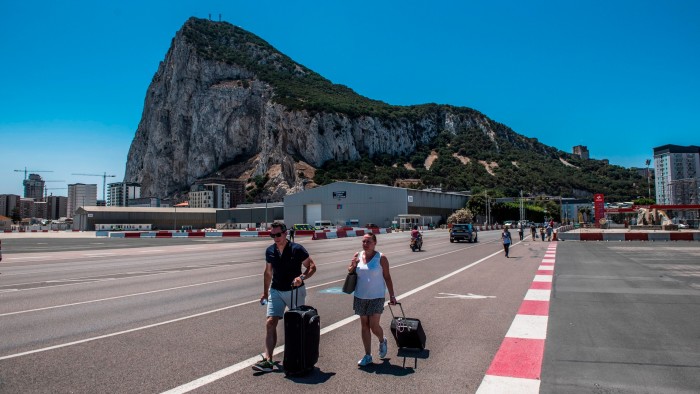Unlock the Editor’s Digest for free
Roula Khalaf, Editor of the FT, selects her favourite stories in this weekly newsletter.
The UK is close to a deal with Spain and the EU over Gibraltar’s post-Brexit status, one of the last outstanding problems created by Britain’s departure from the bloc.
Gibraltar has been in limbo since early 2020 when Brexit came into effect, with London, Brussels and Madrid unable to agree on several issues, including how the territory’s border should be policed.
UK foreign secretary David Lammy flew to Gibraltar on Tuesday and met officials and businesses before flying to Brussels on Wednesday for talks with his Spanish counterpart José Manuel Albares and EU Brexit commissioner Maroš Šefčovič. He was accompanied on the flight by the Gibraltar delegation.
While UK and EU officials have cautioned that a deal may not be reached on Wednesday, the presence of the foreign secretary and a significant representation was widely interpreted as suggesting the long-running talks might be near to concluding.
One person close to the talks said senior officials would not descend on Brussels if there was a significant risk of a deal “falling apart” at the last minute, as has happened before.
“It’s close,” an EU diplomat said.
A Spanish foreign ministry official said: “As always, our desire is to make as much progress as possible and close [a deal] as soon as possible.”
Gibraltar’s post-Brexit status as a British territory that shares a border with the EU — and its Schengen free-travel zone — has raised thorny issues. It has also given Spain, which refuses to recognise British sovereignty over the Rock, a chance to gain more influence.
Gibraltar and Spain both rely on the free movement of people across their land border. But Madrid has gained leverage in the post-Brexit limbo from its ability to hurt Gibraltar by introducing hard passport checks that would choke the daily flow of Spanish workers into the territory.
In return for a semi-open land border, both Spain and the EU want a say over passport checks at Gibraltar’s airport, given that people who travel on to Spain are entering the Schengen area. The UK is wary of giving up sovereignty at the airport, which also serves as a Royal Air Force base.
The negotiations have dragged on for years, even though both sides insisted their opposing stances on which country owned Gibraltar were not up for debate.
Both sides have appeared keen to reach a conclusion as part of a new strategic partnership launched at a summit in London in May.
EU officials say the warmer relationship with the Labour government that took office in July has raised hopes.
More than 15,000 workers cross the border daily to reach Gibraltar from one of Spain’s most impoverished regions. The Rock’s 34,000 residents, meanwhile, rely on imports of food, medicines and other vital supplies from Spain.
The Spanish crown ceded the territory to the UK in 1713 under the Treaty of Utrecht. While Spain has long tried to reclaim the territory, the overwhelming majority of Gibraltar residents favour British rule.
Foreign Office officials have emphasised that the UK will agree only to a deal that will protect British sovereignty and support Gibraltar’s economy. Any deal must also have the full backing of the government of Gibraltar.
One UK official close to the talks cautioned there was still “much to be done in the room” during the talks, saying a deal was not quite ready to be “rubber stamped”.
On the key issue of airport passport checks, Brussels has continued to insist it must check passports at the territory’s airport, while the UK has resisted the presence of Spanish border guards on its territory.
While a possible compromise would be to use staff from Frontex, the EU border agency, the issue remains sensitive.




